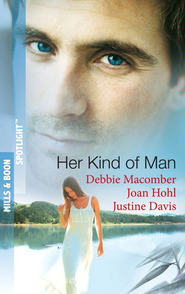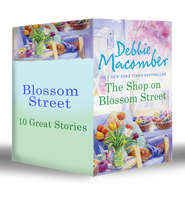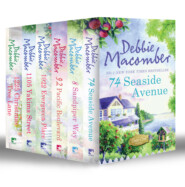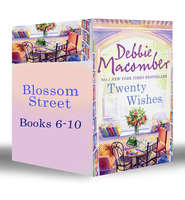По всем вопросам обращайтесь на: info@litportal.ru
(©) 2003-2024.
✖
Glad Tidings: There's Something About Christmas / Here Comes Trouble
Автор
Год написания книги
2019
Настройки чтения
Размер шрифта
Высота строк
Поля
“My ex-husband.”
Emma couldn’t help observing that Earleen seemed more of a conversationalist when she stood on the other side of the kitchen counter. The closer she got to the table, the briefer her answers were. Emma speculated that was because of Earleen’s many years behind a bar. She’d always heard that bartenders spent a lot of time listening and advising—like paid friends. Or psychiatrists.
“The first time I ever tried Mom’s fruitcake recipe was after Larry moved out.”
“I’m sorry.”
“Me, too. Have you ever been married?” Earleen asked.
“No …” The sorry state of her love life was not a subject Emma wanted to discuss.
“Larry and I were high-school sweethearts. He went to fight in Vietnam and when he got back, we had a big wedding. It was the type of wedding girls dream about. Wait here a minute,” she said and bustled out of the kitchen.
In a couple of minutes, she returned with her wedding photograph. A radiantly happy bride smiled into the camera, her white dress fashioned in layers of taffeta and lace. The young soldier at her side was more difficult to read.
“Unfortunately, Larry had a weakness for other women,” Earleen said sadly.
“How long have you been divorced?”
“From Larry? Since 1984.”
“You’ve been married more than once?”
“Three times.”
“Oh.”
“All my husbands were versions of Larry.”
“I see.”
“I didn’t learn from my mistakes.” Earleen turned away. Then, obviously changing the subject, she said, “I imagine you’ll want to sample my fruitcake.” She slid open the bread box and took out an aluminum-foil-wrapped loaf. “Have you noticed that people either love fruitcake or hate it?” she said companionably. “There doesn’t seem to be any middle ground.”
“That … seems to be true,” Emma agreed.
“Like I said, I started baking after Larry left,” she said, busily peeling away the cheesecloth from the loaf-size fruitcake. “I’d never suffered that kind of pain before. I figured if you’ve ever been divorced you’d know what I mean.”
Emma was confused. “I don’t exactly think of fruitcake as comfort food.”
Earleen shook her head. “I didn’t eat it. I baked it. Loaf after loaf for weeks on end. I was determined to bake the perfect fruitcake and I didn’t care how long it took. I must’ve changed that recipe a hundred times.”
“Why fruitcake?”
She paused as if she’d never put it into words. “I’m not sure. I guess I was looking for the happiness I always felt as a kid at Christmastime.”
There it was again, Emma mused. Christmas. It did people in emotionally, and she wasn’t going to allow that to happen, not to her. She found it easy enough to ignore Christmas; other people should give it a try. She might even see if Walt would let her write an article about her feelings. Emma believed she wasn’t alone in disliking all the hype that surrounded Christmas.
“When I was with Larry and my two other husbands, I felt there must be something lacking in me,” Earleen continued. “Now I don’t think so anymore. Time will do that, you know?” She glanced at Emma. “As young as you are, you probably don’t have that much perspective.” Earleen paused and drew in a deep breath.
Emma stopped taking notes. She suspected this was it; she was about to get to the real core of the interview.
“By the time Larry and I split up, both my parents were gone, so I was pretty much on my own. I realize now that I was searching for a way to deal with the pain, although God knows the marriage was dead. That’s where the fruitcake came in.”
“The comfort factor,” Emma said with a nod. “How long were you and Larry together?” she asked.
“Sixteen years. It’s a shame, you know. We never had kids and it was real lonely after he left.”
“What happened to him?” Secretly Emma hoped he was miserable. In some ways Earleen reminded Emma of her mother.
The woman sighed. “Larry married the floozy he’d taken up with, and the two of them got drunk every night. It only took him a few years to drink himself to death.”
“How sad,” Emma said, and she meant it.
Earleen shrugged. “I was single for nearly ten years. I thought I’d learned my lesson about marrying the wrong man, but obviously I hadn’t.”
“What about the other two husbands?”
“Morrie courted me for a long time before I agreed to marry him. He didn’t have a roving eye so much as he did a weakness for the bottle.” She paused. “Of course, Larry had both. The thing is, and you remember this, young lady, you don’t meet the cream of the eligible bachelor crop working in a tavern.”
Emma scribbled that down so Earleen would think she’d given due consideration to her words.
“Morrie died of cancer a couple of years after we were married.” She shook her head. “I never should’ve married Paul after that.”
“What happened with Paul?”
A dreamy expression came over her. “Paul looked so much like Larry they could’ve been brothers. Unfortunately, looks weren’t the only trait they shared. We were married only a year when he suffered a massive stroke. He had a girlfriend on the side but he really loved my fruitcake. I think if Larry had lived, he would have, too.”
“Do you have anyone to share your good news with?” Emma asked. “About being a finalist?”
Earleen shrugged again. “Not really, but it doesn’t matter.”
“Of course it matters,” Emma insisted. “Your recipe was one of only twelve chosen from across the entire United States. You should be kicking up your heels and celebrating.”
“I will with friends, I suppose.” Earleen opened her cutlery drawer for a knife and sliced through the loaf. “It’s time I started baking again,” she said. “This close to Christmas, I’ll bake my mincemeat pies. People are already asking about them.”
“When do you bake your fruitcakes?”
Earleen sipped her coffee, her fingers sparkling in the light. All ten of them. “I usually bake up a batch every October and let it set a good two months before I serve it. The longer I give the alcohol to work, the better. Then, before Easter, I bake another version that’s similar but without the dried fruit.” Earleen moved the slice onto a plate and brought it over for Emma to taste.
Although she wasn’t a fan of fruitcake, Emma decided it would be impolite to refuse. Earleen watched and waited.
Emma used her fork to break off a small piece and saw that it was chock-full of the dried fruit to which she objected most. She glanced up at the older woman with a quick smile. Then she carefully put the fruitcake in her mouth—and was shocked by how good it tasted. The cake was flavorful, moist and pungent with the scent of liquor. The blend of fruit, nuts, applesauce and alcohol was divine. There was no other word to describe Earleen’s fruitcake.
“You like it, don’t you?”
“I do,” Emma assured her, trying not to sound shocked.
“It’s excellent.”











